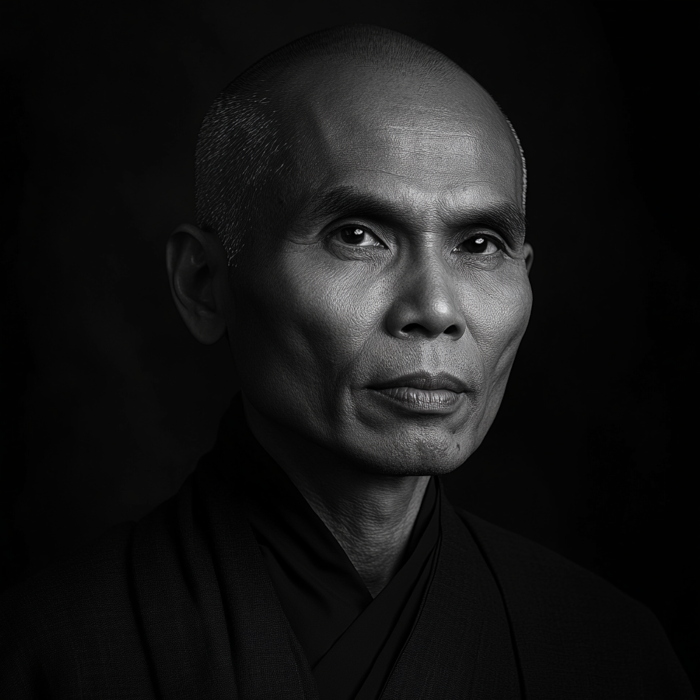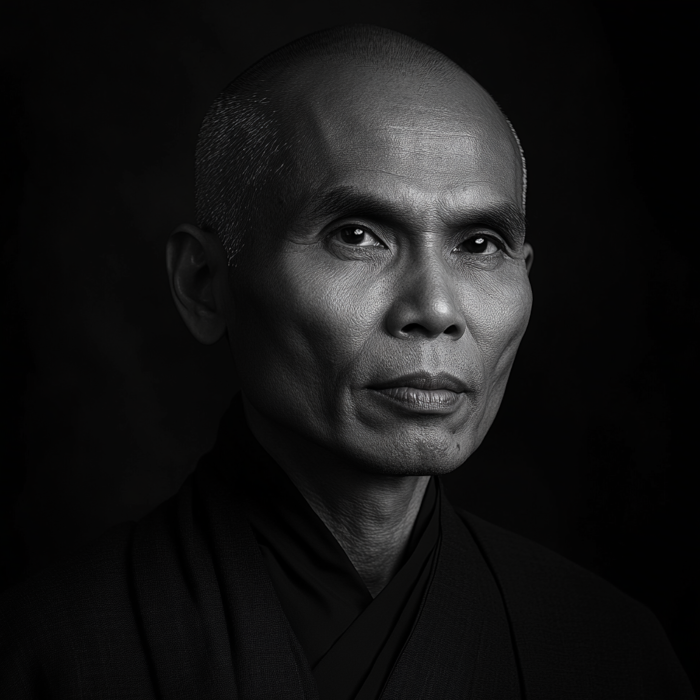


Thich Nhat Hanh (1926–2022) was a Vietnamese Zen Buddhist monk, teacher, author, poet, and peace activist. Widely recognized as one of the most influential spiritual leaders of the 20th and 21st centuries, he was instrumental in introducing mindfulness and engaged Buddhism to the West. Thich Nhat Hanh's teachings on peace, compassion, and mindfulness have had a profound impact on millions of people worldwide, and his work in promoting interfaith dialogue and nonviolent conflict resolution has earned him global respect.
Engaged Buddhism: During the Vietnam War, Thich Nhat Hanh developed the concept of "Engaged Buddhism," which emphasizes the application of Buddhist teachings to social, political, and environmental issues. He believed that spiritual practice should not be separated from the challenges of daily life and that Buddhists should actively work to alleviate suffering in the world.
Peace Efforts: Thich Nhat Hanh was a vocal advocate for peace during the Vietnam War, opposing both the violence of the war and the oppression of the Vietnamese people by various regimes. In 1964, he founded the School of Youth for Social Service (SYSS), a grassroots relief organization that provided aid to war-torn villages, built schools and clinics, and helped resettle displaced people.
Exile and International Advocacy: In 1966, Thich Nhat Hanh traveled to the United States and Europe to promote peace and advocate for an end to the Vietnam War. His efforts drew the attention of civil rights leader Dr. Martin Luther King Jr., who nominated him for the Nobel Peace Prize in 1967. Due to his peace activism, Thich Nhat Hanh was exiled from Vietnam and could not return to his homeland for nearly 40 years.
Plum Village: In 1982, Thich Nhat Hanh founded Plum Village, a Buddhist monastic community in the Dordogne region of France. Plum Village became the largest Buddhist monastery in the West and a center for mindfulness practice, drawing thousands of visitors annually from around the world. The community focuses on mindful living, meditation, and the practice of "mindful walking," "mindful eating," and other daily activities.
Mindfulness and Global Influence: Thich Nhat Hanh played a key role in popularizing the practice of mindfulness in the West. He taught that mindfulness, the art of living fully in the present moment, is a path to inner peace and happiness. His teachings emphasized the importance of cultivating awareness in everyday life and using that awareness to develop compassion for oneself and others.
Writings and Publications: Thich Nhat Hanh was a prolific writer, authoring more than 100 books, including The Miracle of Mindfulness (1975), Peace Is Every Step (1991), The Art of Power (2007), and No Mud, No Lotus: The Art of Transforming Suffering (2014). His books have been translated into many languages and are widely regarded as essential reading for anyone interested in Buddhism, mindfulness, or spirituality.
Interbeing: One of Thich Nhat Hanh's central teachings is the concept of "interbeing," the idea that all things are interconnected and interdependent. He taught that understanding this interconnectedness is key to overcoming the illusion of separation and realizing the unity of all life.
Nonviolence and Compassion: Thich Nhat Hanh advocated for nonviolence, compassion, and deep listening as essential practices for creating peace in oneself and in the world. He believed that personal transformation through mindfulness and compassion could lead to social and global transformation.
Engagement with the World: His philosophy of engaged Buddhism called for Buddhists to take an active role in addressing societal issues, including war, environmental degradation, and social injustice. He encouraged his followers to bring their spiritual practice into the world, working for the welfare of all beings.
Return to Vietnam: After decades of exile, Thich Nhat Hanh was allowed to return to Vietnam in 2005, where he continued his peace work and founded monasteries. He returned to his homeland permanently in 2018 after suffering a stroke in 2014, which left him partially paralyzed and unable to speak.
Death: Thich Nhat Hanh passed away peacefully on January 22, 2022, at the age of 95 in the Tu Hieu Temple in Huế, Vietnam, where he had first been ordained as a novice monk.
Legacy: Thich Nhat Hanh's legacy lives on through his teachings, his writings, and the global community of practitioners he inspired. His emphasis on mindfulness, compassion, and peace has left a lasting impact on the world, influencing not only Buddhist practitioners but also those in various fields, including psychology, education, and social activism.
Continued Influence: His teachings on mindfulness have been integrated into many therapeutic practices, such as mindfulness-based stress reduction (MBSR), and continue to be a source of guidance and inspiration for individuals seeking to cultivate inner peace and contribute to a more compassionate world.
Thich Nhat Hanh's life and teachings exemplify the power of mindfulness, compassion, and peaceful action. His work has touched millions of lives, and his influence continues to grow, offering timeless wisdom for those seeking a path of peace and understanding in the modern world.

We use cookies
We use cookies and other tracking technologies to improve your browsing experience on our website, to show you personalized content and targeted ads, to analyze our website traffic, and to understand where our visitors are coming from. Privacy Policy.